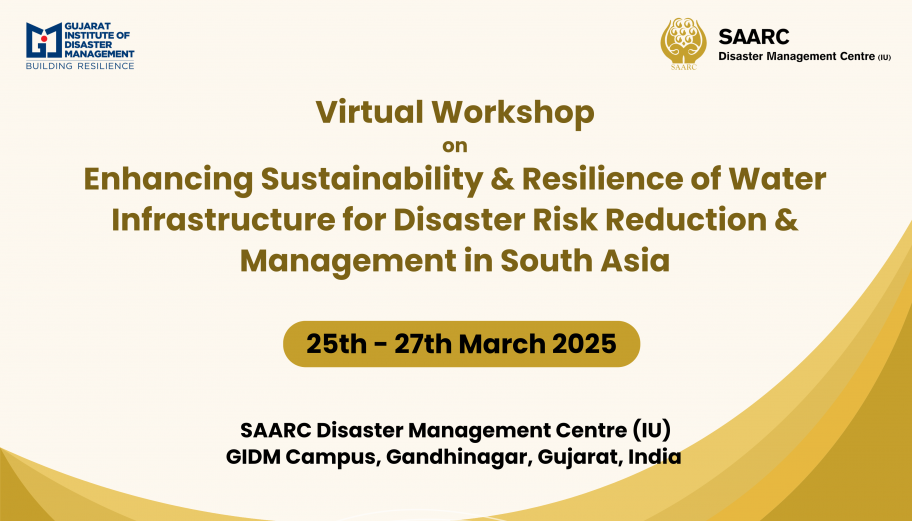Virtual Workshop on Enhancing Sustainability & Resilience of Water Infrastructure for Disaster Risk Reduction & Management in South Asia

| Duration | 25/03/2025 to 27/03/2025 |
| Registration Deadline | 25/03/2025 |
Virtual Mode
Background
South Asia, home to about 2 billion people, is one of the world’s most disaster-prone regions, experiencing 39% of global disaster occurrences, with a majority linked to water-related hazards such as floods, droughts, cyclones, flash floods, landslides and water quality emergencies. Each year, floods affect over 120 million people in the region, causing economic losses exceeding $10 billion, while cyclones, particularly in coastal areas like the Bay of Bengal and Arabian Sea, result in damages of over $8 billion and threaten 80 million coastal residents. Droughts influence 40% of South Asia’s agricultural land, placing the livelihoods of over 500 million people at risk and causing $7 billion in annual losses. Over the last two decades, water-related disasters have disproportionately affected vulnerable populations, with an estimated 1.8 billion people impacted. During droughts, the depletion of nearby water sources forces individuals to spend significantly more time, energy and money fetching water, while during floods, water contamination leads to 40% of children under the age of five suffering from waterborne diseases.
The damage to critical water infrastructure has been severe, with 95% of reported infrastructure losses in South Asia from 2010 to 2025 attributed to water-related disasters. This has reduced access to clean drinking water for over 400 million people annually, disrupted sanitation systems, and damaged irrigation infrastructure critical for food security. These challenges have significantly hindered progress toward SDG 6, with 29% of South Asians still lacking access to safely managed drinking water services and 45% without adequate sanitation in 2025. The region faces a growing climate resilience finance gap for water infrastructure, estimated at $50 billion annually, underscoring the urgent need for innovative financial solutions.
This virtual program seeks to address these critical challenges by bringing together stakeholders, including policymakers, disaster management practitioners, water resource experts, and international organizations. It aims to foster knowledge sharing, promote regional collaboration, and advocate for innovative policies to enhance water infrastructure resilience. By creating actionable pathways to mitigate water-related disaster risks, the program will help safeguard communities, strengthen regional cooperation and accelerate progress toward sustainable development in South Asia.
Aim and Objectives:
The aim of the workshop is to bring together key stakeholders from SAARC Member States to share knowledge and insights on the challenges posed by water-related disasters such as floods, droughts, and cyclones. The workshop will focus on enhancing the resilience of water infrastructure in the region, fostering regional collaboration and discussing the urgent need for innovative policies and financial solutions to address the impact of these disasters on communities and infrastructure.
The primary objectives of this workshop are;
- Provide participants with in-depth knowledge of the region's vulnerability to water-related hazards, their impacts on communities and cascading effects on critical infrastructure.
- Explore innovative solutions, including structural and non-structural measures such as nature-based solutions, climate-resilient design and retrofitting existing systems.
- Foster dialogue among South Asian nations to address transboundary water-related challenges and promote joint disaster risk reduction strategies.
- Discuss barriers such as inadequate regulatory frameworks, institutional capacity and enforcement mechanisms.
- Share success stories, case studies and global examples to inspire local and regional solutions for improving water infrastructure resilience.
- Identify and advocate for innovative financing models like public-private partnerships, green bonds and resilience funds to close the water infrastructure financing gap in South Asia.
Target Audience:
The workshop aims to engage ten senior officials from each of the SAARC Member States, specifically from Disaster Management Authorities, Water Supply, Water Resource and Sanitation and Climate Change/ Environment Departments.
Date & Venue
The workshop will be conducted virtually by the SAARC Disaster Management Centre (IU), based in Gandhinagar, Gujarat, India, during 25-27 March 2025.
| # | Topic | Presenter | View/ Download |
|---|---|---|---|
| 1 | Session 1: Changing Climate: Need for Sustainable & Resilient Water Infrastructure | Dr. Swapna Panickal Centre for Climate Change Research, Indian Institute of Tropical Meteorology |
View/ Download |
| 2 | Case Study 1: Building Climate Resilient Water Infrastructure in South Asia | Dr. M. Dinesh Kumar Executive Director, Institute for Resource Analysis and Policy |
View/ Download |
| 3 | Session 2: How can we work with the river? Infrastructure, river dynamics and nature-based solutions | Prof Richard Williams School of Geographical & Earth Sciences, University of Glasgow, UK |
View/ Download |
| 4 | Session 3: Compatible fusion of Nature-based & Innovative Solutions for improving resilience of Water Infrastructure | Prof Trevor Hoey Pro Vice-Chancellor, International & Sustainability, University of London |
View/ Download |
| 5 | Session 4: Aging Water Infrastructure: The Need for Redundancy in Water Systems | Dr. Ranjana Ray Chaudhari Coca-Cola Department of Regional Water Studies, TERI School of Advanced Studies |
View/ Download |
| 6 | Case Study 2: From Water Scarcity to Water Security: Gujarat’s Water Infrastructure Development | Dr. M. B. Joshi Consultant, GIDM |
View/ Download |
| 7 | Case Study 3: Community Led Traditional Practices with proven Resilience against Disasters | Dr. Anurag Danda, Director & Lead- Sundarbans Program, WWF-India |
View/ Download |
| 8 | Case Study 4: Advancing Climate Resilience of Water Sector in Bhutan (ACREWAS) | Ms. Thinley Choden, Principal Engineer, Water and Sanitation Division, Department of Infrastructure Development, Ministry of Infrastructure and Transport, Bhutan |
View/ Download |








